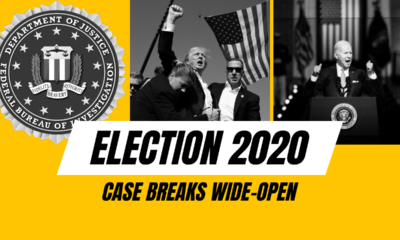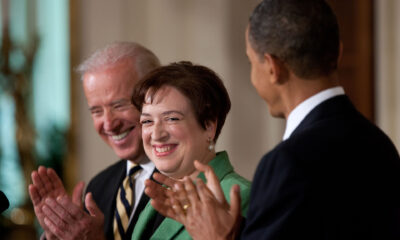Constitution
Christians, don’t blow your chance!
Christians have an opportunity, with three recent Supreme Court precedents, to counterattack against the enemies of freedom.
Mr. Justice Samuel A. Alito spoke at the Religious Liberty Summit at the Notre Dame School of Law. There he took to task many foreign dignitaries who criticized his Opinion of the Court in Dobbs v. Jackson Women’s Health Organization. But he spent more time criticizing those who want Christians to keep religion a strictly private affair. To be sure, his comments were very valuable. But a call for a more militant Christianity, that presses the issues of sin (and crime) about which only Christians seem to care, seemed to be missing from his discourse. Not that he would disagree with it, but he failed to mention it. Encouraging Christians to use the opportunity Justice Alito and his colleagues have given us, is a vitally important message.
The attacks on Alito were attacks on Christians
One can hear Justice Alito’s speech here.
Additional reportage comes from BizPacReview and The Daily Wire. BizPacReview has another article treating the criticism of the Dobbs decision by the Duke of Sussex.
The remarks by Justice Alito that get all the attention, were his pushback against foreign critics of his Dobbs opinion.
Now when I was putting these remarks together, I was tempted at this point to provide some examples. I am not a diplomat … I wouldn’t be very bad about it, but it was unusual for me, this sort of diplomatic impulse came upon me, and I said to myself, “you’re an American judge, and what business is it of yours to criticize decisions that are handed down by foreign courts?”
I’ve had some second thoughts over the last few weeks, since I had the honor this [Supreme Court] term of writing the only Supreme Court decision in the history of that institution that has been lambasted by a whole string of foreign leaders, who felt perfectly fine commenting on American law.
At this, his audience started to laugh. He went on:
One of these was former Prime Minister Boris Johnson. But he paid the price.
Now he had them laughing even harder.
Post hoc ergo propter hoc, right?
That last Latin phrase means, “It happened after this; therefore you can say that this caused it.”
Taking the high road
After that particular Latin quip, Alito went on:
But others are still in office. [French] President [Emmanuel] Macron, and [Canadian] Prime Minister [Justin] Trudeau, I believe, are two. But what really wounded me, what really wounded me, was when the Duke of Sussex addressed the United Nations, and seemed to compare the decision whose name may not be spoken with the Russian attack on Ukraine.
Play this video of the Duke of Sussex calling Dobbs part of “a global assault on democracy and freedom.” Then decide.
Then Justice Alito said something more valuable:
Well, despite this temptation, I’m not gonna talk about cases from other countries. All I’m gonna say is that, ultimately, if we are going to win the battle to protect religious freedom in an increasingly secular society, we will need more than positive law.
Positive law is the law that legislatures pass and to which executives give assent. Natural law is the law that proceeds from human nature.
But even before this part of his speech, Justice Alito said this, that rates more attention:
No Constitution or international agreement provides unqualified protection for religious liberty, nor should it.
He gave the obvious example of a religion people should not be free to exercise: the child-sacrifice cult of Molech.
How Christians suffer from high-minded-sounding language
Then he mentioned the limits on religious liberty by the European Convention on Human Rights (Article 9):
Freedom to manifest one’s religion or beliefs shall be subject only to such limitations as are prescribed by law and are necessary in a democratic society in the interests of public safety, for the protection of public order, health or morals, or for the protection of the rights and freedoms of others.
Then, says Alito,
What sort of judge cannot take a limitation like that and shrink religious liberty as much as that judge wants? And if the judge does not highly esteem religious liberty, [he can shrink it] all the way down to what people often talk about today. And that is freedom of worship. “Freedom of worship” means freedom to do these things that you like to do in the privacy of your home, or your church or your synagogue or your mosque or your temple. But when you step outside into the public square, in the light of day, you had better behave yourself like a good secular citizen.
And that is the problem Christians face – and have faced since James G. Blaine promoted his Amendments to State constitutions.
You don’t win by defense, but by attack and counterattack
Note that Franklin Delano Roosevelt mentioned “freedom of worship” and “freedom of speech” as two of his Four Freedoms. The other two were freedom from want and freedom from fear. Understand this: freedom from is not freedom at all. It pretends to be a guarantee of safety, nothing more. In that context, “freedom of worship” becomes a weak freedom indeed.
Christians in America especially have forgotten that the Founders did found America as a Christian nation. They assumed that “a Christian nation” was a legitimate default state. Recall what John Adams said about “passions unbridled by morality and religion.”
Avarice, Ambition, Revenge or Gallantry, would break the strongest Cords of our Constitution as a Whale goes through a Net. Our Constitution was made only for a moral and religious People. It is wholly inadequate to the government of any other.
Then James G. Blaine came for the Catholics. But, as Father Niemöller might have said, other Christians were not Catholics, so they didn’t speak up. Then Blaine’s successors came for the non-Catholic Christians. And now there isn’t anyone else to speak up.
Except now Justice Alito and his colleague Justice Clarence Thomas have given us three new precedents. Together they present an opportunity Christians dare not squander. They are, in reverse order of decision but forward order of importance:
- Kennedy v. Bremerton School District (21-418),
- Dobbs v. Jackson Women’s Health Organization (19-1392), and
- Carson v. Makin (20-1088).
Christians, take heart from Elisha – and four unlikely heroes
One can best understand the magnitude of this opportunity by examining this story from the Second Book of the Kings. Jehoram, King of the Northern Kingdom, faced a deadly crisis. The Arameans (ancient Syrians) had laid siege to his capital city of Samaria. Food prices were exorbitant and typically bought food anyone would consider unclean – and some resorted to cannibalism.
The prophet Elisha (successor to Elijah) predicted an end to the famine. Furthermore, he said it would happen one day after he spoke.
Four lepers happened to be scavenging at the entrance to the main gate. They decided that they could stay where they were and starve, or enter the city and starve. Or they could give themselves up to the Arameans. This they decided to do – but when they approached the enemy camp, they found it deserted! (God had sent a hallucination on the Arameans. So they, imagining they heard a combined Hittite and Egyptian force attacking their rear, fled in a total rout.) These four outcasts walked into an intact camp, plundered the first tents they saw, and relieved their hunger and thirst. Then they decided that they ought to report this intelligence to the king and his court.
They did – and King Jehoram at first didn’t believe the report. That is, until his staff urged him to send out a small recon party. The recon party reported everything was as the lepers said it was.
The lesson
All believing Christians should take the lesson from that. Doubt causes you to miss opportunities. In this case, those three Supreme Court precedents are the equivalent of the Arameans fleeing their siege camp. Let us not wait for the modern Arameans to realize they’ve been had! Press the advantage.
Justice Alito was right: we need more than positive law to secure this victory. Christians must press for a due respect for natural law. According to Jefferson, natural law recognizes the rights to life, liberty and property.
Other countries, especially Western countries (sad to say), don’t respect that today. This should surprise no one. Christians have retreated to a “freedom of worship” position, and now will surely lose that, too. Unless we turn and attack those who question the validity, not only of Christianity, but of the natural rights of human beings. That means all human beings, including the unborn.
Terry A. Hurlbut has been a student of politics, philosophy, and science for more than 35 years. He is a graduate of Yale College and has served as a physician-level laboratory administrator in a 250-bed community hospital. He also is a serious student of the Bible, is conversant in its two primary original languages, and has followed the creation-science movement closely since 1993.
-

 Accountability2 days ago
Accountability2 days agoWaste of the Day: Principal Bought Lobster with School Funds
-

 Constitution2 days ago
Constitution2 days agoTrump, Canada, and the Constitutional Problem Beneath the Bridge
-

 Executive23 hours ago
Executive23 hours agoHow Relaxed COVID-Era Rules Fueled Minnesota’s Biggest Scam
-

 Civilization22 hours ago
Civilization22 hours agoThe End of Purple States and Competitive Districts
-

 Civilization5 days ago
Civilization5 days agoThe devil is in the details
-

 Executive4 days ago
Executive4 days agoTwo New Books Bash Covid Failures
-

 Civilization4 days ago
Civilization4 days agoThe Conundrum of President Donald J. Trump
-

 Executive4 days ago
Executive4 days agoThe Israeli Lesson Democrats Ignore at Their Peril













The simple fact is Christianity is the root of freedom – especially today.
[…] That’s why we must get back to morals and religion. […]
[…] the government, not the other way around. And why Christian governance is an ideal, and why CNAV exhorts Christians to seize their present […]